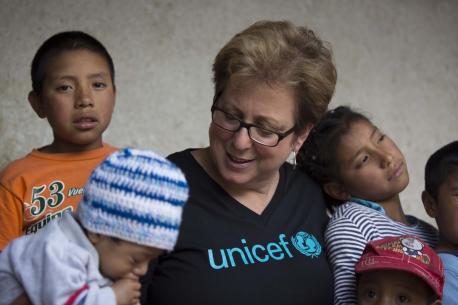
Reflections on Yom Kippur
How will our society fare when it's judged by its treatment of the world's children?
As millions of Jews around the world come together for Yom Kippur, I am reminded of the many things that unite us on this holiday. First, there is a shared set of rituals we partake in — fasting, prayer, repentance. Above all however, we are unified by the act of introspection that makes us not only reflect on our actions, but also the state of the world around us.
This year, I find myself asking the same question I have turned to throughout my 13-year journey as the President and CEO of UNICEF USA: How will our society fare when it’s judged by its treatment of the world’s children?
As the daughter of a child refugee, I learned early on that the young suffer most from conflict and violence around the world.
As the daughter of a child refugee, I learned early on that the young suffer most from conflict and violence around the world. Fleeing Nazi persecution in her home country, my mother came to the United States when she was just 6 years old, avoiding the fate of over 1 million children who were killed in the Holocaust. Her story is what has inspired me to speak on behalf of the world’s most vulnerable children.
During my time with UNICEF, we’ve made tremendous strides to improve children’s well-being and advance the United Nations' Sustainable Development Goals (SDGs), yet millions of children still lack the protections they need to grow up safe and healthy. Currently, an estimated 258 million children do not attend school and 169 million lack access to lifesaving vaccines. In countries like Sudan and Yemen, children are dying of starvation and military violence.
As we begin the Jewish New Year, I am calling upon the world's leaders to commit to focusing on three priority areas to empower young people all over the world: education, medical care and protection
As we begin the Jewish New Year, I am calling upon the world’s leaders to commit to focusing on three priority areas to empower young people all over the world. These are not just moral ideas, but smart choices that improve the world and outcomes for all. This is especially important to me as I prepare to leave my role at the organization in a few short weeks. The world’s children need us to continue to add to the champions continuing to take this cause forward.
The first priority is education, especially for girls. A 2018 World Bank report found that limiting girls’ access to education costs countries up to $30 trillion in lost lifetime productivity and earnings — money that could instead be used to strengthen access to health services and improve welfare. On average, women who attended secondary education are more likely to work and earn almost twice as much as those who did not. By empowering young people through education, especially girls, we can break the cycle of poverty that impedes the futures of millions of children.
The second priority is medical care, specifically access to vaccines. Focusing on immunizing the world’s most vulnerable has been a force for good, and it works. When UNICEF joined with world leaders and others over the last ten years to administer vaccines to hundreds of millions of children, we nearly eradicated polio – a feat we once thought impossible. Evidence shows that healthier children contribute more to the economy later in life. In fact, access to essential health for every child enables more equal access to better paying jobs later in life, as well as improved productivity, and can ultimately bolster a country’s economic prospects.
The third priority is protection, especially from war and conflict. Children are particularly vulnerable to abuse, exploitation and trafficking during emergencies and armed conflicts. Systematic violence, particularly against young girls, is increasingly used as a weapon of war.
When people ask me how they can support children, I tell them to use what they have, start where they are. Use your voice, your wallet, your platforms.
Investments in children improve societies by strengthening families, economies and future leaders. But this work cannot be done alone. When people ask me how they can support children, I tell them to use what they have, start where they are. Use your voice, your wallet, your platforms. There’s a role for everyone to play in making a better world for children — politicians, parents, celebrities, teachers, corporate leaders. As we embrace the new year ahead, we must all be forces for positive change in the years to come, while making a better world for this generation and the next.
Learn more about how you can support UNICEF's work to save and protect the world's children.
Caryl M. Stern is the President and CEO of UNICEF USA, and author of the book "I Believe In Zero."
Top photo: UNICEF USA President and CEO Caryl M. Stern visits with children in Guatemala. © UNICEF USA/Kasm
HOW TO HELP
There are many ways to make a difference
War, famine, poverty, natural disasters — threats to the world's children keep coming. But UNICEF won't stop working to keep children healthy and safe.
UNICEF works in over 190 countries and territories — more places than any other children's organization. UNICEF has the world's largest humanitarian warehouse and, when disaster strikes, can get supplies almost anywhere within 72 hours. Constantly innovating, always advocating for a better world for children, UNICEF works to ensure that every child can grow up healthy, educated, protected and respected.
Would you like to help give all children the opportunity to reach their full potential? There are many ways to get involved.



